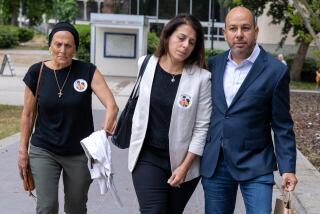Man Guilty of 2 Boys’ ‘93 Murders
- Share via
SAN DIEGO — As the mothers of the victims embraced and wept, a jury Wednesday convicted a 40-year-old sex offender of raping and murdering two young boys in 1993 in a crime that terrified parents and baffled police until DNA evidence linked a prison inmate to the case.
After eight hours of deliberation, the jury convicted Scott Thomas Erskine of the strangling murders of Charlie Keever, 13, and Jonathan Sellers, 9. The jury also found Erskine guilty of torturing the boys, a “special circumstance” that can lead to the death penalty.
Prosecutors have said they will seek that punishment. The same jury will decide whether Erskine should die or serve life in prison without parole.
Erskine, already serving a prison sentence for a rape that occurred six months after the two murders, showed no emotion as the verdict was read. His attorney had offered to have Erskine plead guilty if prosecutors would recommend life in prison rather than death; the offer was rejected.
If the jury renders a verdict of death, Superior Court Judge Kenneth So could impose a life prison sentence, although that option is rarely chosen by San Diego judges.
The two boys were best friends and often went hiking and bike-riding in an isolated, brush-covered area near their homes in the blue-collar Palm City neighborhood of San Diego. They disappeared March 27, 1993, and a massive search was launched; their bodies were found two days later by a jogger.
The brutality of the crimes shocked the public, and fearful parents began walking their children to school and keeping them away from the area near Otay Creek where the bodies were found. Ten police detectives were assigned to work full time on the case. Billboards pleaded with the public for help in solving the crime.
“We all were scared,” recalled Linda Silas, who lived in the neighborhood. “Charlie and Jonathan were everybody’s sons.”
Despite national media exposure and a $10,000 reward for information, police were stymied. They followed leads in San Diego, Mexico, Oregon, Florida and New York; Royal Canadian Mounted Police checked possible suspects in Canada. Dozens of sex offenders in the area and transients known to live near the creek were questioned.
The FBI developed a psychological profile of the killer; a Border Patrol tracker tried to follow footprints left at the scene. Under the emotional strain of the tragedy, the marriage of one victim’s parents deteriorated and the couple divorced.
In a final attempt to solve the case, police shot a reenactment video three years ago, backed by strains of Eric Clapton’s mournful song “Tears in Heaven” about the death of his son. The boys’ mothers held news conferences begging the public for help in finding the killer. Still, there were no arrests.
But in 2001, DNA tests linked the crime to Erskine, who was serving a 70-year sentence at Wasco State Prison in Kern County for the 1993 rape of a San Diego woman whom he had lured into his apartment.
Erskine, a former car rental company employee, was taking business classes at a community college in Chula Vista when he was arrested for the rape. He has a long criminal record including theft and violence.
Prosecutors told jurors that Erskine is a suspect in the murder and rape of a 26-year-old Florida woman in 1989.
The DNA test was done as part of a program to take DNA samples from state prisoners and compare them to forensic evidence from unsolved crimes.
Erskine had not been considered a suspect.
Jonathan’s mother, Melina Sellers, and Charlie’s mother, Maria Keever, attended every day of the trial, comforted by other relatives. The defense adopted the unusual strategy of not calling any witnesses or asking any questions of prosecution witnesses.
It was so unusual, in fact, that the judge held a closed-door hearing midway through the trial to inquire about the tactics.
Some of the DNA evidence against Erskine came from cigarette butts that he allegedly left at the scene near a “fort” that the two boys and their pals had built. Also found nearby was rope that Erskine allegedly used to strangle the boys.
“It was a horrible way to die,” prosecutor Valerie Summers told jurors.
More to Read
Sign up for Essential California
The most important California stories and recommendations in your inbox every morning.
You may occasionally receive promotional content from the Los Angeles Times.













